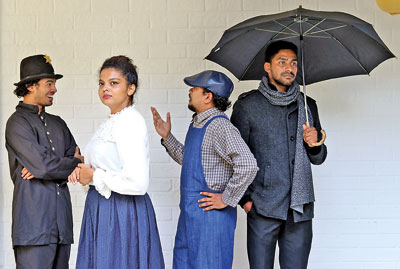Arts
Getting to know those everyday people of Our Town
It is not surprising that the celebrated American playwright and novelist Thornton Wilder’s Our Town got the golden laurels of being “the only play still performed at least once each night somewhere in the world”. It may seem a play with a pall of darkness hovering over it, but when this darkness is actually therapeutic shock, and makes humanity wake up to one of its central follies, it becomes a positive and rejuvenating- and in fact sunny- experience.

The characters of ‘Our Town’: Exploring the small things that matter
The central message Our Town transmits is about the preciousness of life- the importance of appreciating those small everyday things that make it up.
Ranga Jayaratne, with her group Cue Theatre, is bringing this metatheatrical play alive for the second time. Some of the cast had been with her in the previous production of 2015.
The backdrop is the small fictional town of Grover’s Corners, New Hampshire, in roughly the first decade of the twentieth century. It chronicles the lives of the people in the town for over 13 years. Chavika Nanayakkara plays Emily Webb, one of the central characters whom we follow from precocious girl to excited bride and finally brooding revenant. Chavika says it was easy to fit into the role, Emily being an ordinary girl with a kind of family life she could connect with.
That is not a sentiment shared by Sakeena Razick who plays Myrtle Webb, Emily’s mother. As Mrs. Webb, she has to put a cap on her usually frothing emotions, playing a hardworking, no-nonsense-please mother who tries not to show the depth of her real caring for her children. At the end, of course, she wishes she had been less circumspect with her feelings.
However, Sakeena enjoyed giving free rein to the bossy person in her who likes to have everything around her spick and span and in order. She also loves the simplicity of the play which, true to the genre of metatheatre, uses almost no props. She finds that the simplicity itself allows so much to come out- with nothing to distract you from the message it transmits.
Sakeena is enthralled by the frilly costumes from the beginning of the 20th century, and believes audiences will warm to the endearing American small town where the action unrolls.
Ryan Henderlin plays George Gibbs, who is the boy-next-door Emily falls in love with and eventually marries. Ryan describes George as the typical ‘jock’- a baseball player who is the class president; stubborn at home- paying little heed to his mother but afraid of his dad. Portraying this likable young man was easy, and Ryan also found that the play held up a magic mirror to himself- things he had not realized about himself were made clear to him and he says the play will do that to anyone- cast or audience.
Romario Schokman plays Dr. Gibbs, the town’s only medical practitioner. He loves his wife and is understanding towards his children. Romario had to hunt within him to come up with the fitting persona and manifest the right emotions, but once he got it right he could connect with the character. He says Gibbs is the kind of father he would like to be.
A major challenge, for him as well as for the others, was that props had to be imagined. Miming the stirring of a teacup with bare hands, for example, required a lot of skill.
For Romario, a major strength of the play is that it “tells people what they are doing is wrong without making them resent it.” What really matters in life are the people and relationships- not the material things we hanker after. “The play teaches us how to make deeper connections with the people in our lives.”
Romario says that the play would be wonderfully instructive for younger audiences- “teenagers or young adults who are yet to form new families”. He emphasizes that “the earlier you get this kind of knowledge and wisdom, the more useful it will be for you to get through life- a fulfilled and content life rather than one just filled with material longings.”
Chathuranga Gunatillake plays Joe Stoddard the undertaker (whose role is small but symbolic) and is also the choral director. Chathuranga believes the play will teach audiences to value those small things in life we take for granted- “rather than going in search of the biggest thing they can find.” The play is lightened by the choir who perform a number of hymns.
For Chathuranga as well as for the entire cast, the rehearsals meant much edification and enlightenment even amidst the excitement, fun, hilarity, the cast outings and the late night kottu sessions. Cue Theatre hopes to light up the audiences with the message, as Emily Dickinson put it, that “Forever is composed of (little) nows.”
Our Town goes on the boards at the Lionel Wendt on September 22 and 23 starting at 7.30 p.m; the tickets priced at Rs. 2000, 1500, 1000 and 750. For advance bookings and delivery, contact 0778631011.

